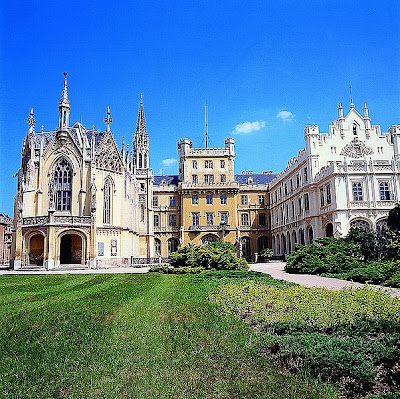The Lednice-Valtice Cultural Landscape (also Lednice-Valtice Area or Lednice-Valtice Complex, Czech: Lednicko-valtický areál) is a cultural-natural complex of 283,09 km² in the Czech Republic, South Moravian Region, close to Břeclav and Mikulov.
The Lednice-Valtice Area is registered in the list of monuments protected as World Heritage by UNESCO next to another site - Pálava Landscape Protected Area, registered by UNESCO only a few years prior to the nearby Pálava Biosphere Reserve. Such close vicinity of two landscape systems protected by UNESCO is world-unique.
History and description
At the end of the 18th century, the local manor lordship - the House of Liechtenstein - began to create a unique manmade landscape complex - The Lednice - Valtice Area. During the 19th century, the Liechtenstein family continued transforming the area, which has since been called the "Garden of Europe", into a large landscape park with two centres:
- Valtice Castle (and contiguous town)
- Lednice Castle (and contiguous village)
Except for above mentioned, there are a lot of bigger or smaller pavilions scattered throughout the whole complex, often serving as hunting lodges :
- Rajsna (German: Reistna, The Colonnade) - a Classicist colonnade on the top of a hill ridge above Valtice (like a gloriette) from 1810s-1820s
- Belvedere
- Rendezvous (or Temple of Diana) - a hunting lodge in a form of a Classicist arch from 1810s
- St Hubert Chapel (Kaple svatého Huberta) - a Neo-Gothic column structure from 1850s dedicated to the patron saint of hunters, situated in the Pine wood
- Border House (Hraniční zámeček) - a Classicist chateau built in 1820s directly on the former (until 1920) bordline between Lower Austria and Moravia
- Temple of the Three Graces (Tři Grácie) - a semicircle gallery with allegorical statues of Sciences and Muses and a statue of the Three Graces from 1820s
- Pond House (Rybniční zámeček) - ashore of one of the Lednice Ponds
- Nový dvůr (German: Neuhof, New Farm) - a Classicist farm finished in 1809, originally used for sheep husbandry, nowadays for horse breeding
- Apollo Temple (Apollónův chrám) - a Classicist hunting lodge from 1810s, ashore of one of the Lednice Ponds
- Hunting Lodge (Lovecký zámeček) - a Classicist house from 1806
- John's Castle (Janohrad) - a Neo-Gothic "artificial ruins" (Czech: umělá zřícenina, German: künstliche Ruine) in style of a castle, finished in 1810
- Minaret - a Moorish Revival structure (62 m high) in the Lednice Castle garden (finished in 1804), it serves as an observation tower
- Obelisk - erected in memory of the peace treaty of Campo Formio (1798)
- Pohansko - an Empire-style hunting lodge finished after 1812, it houses an exhibition of Břeclav Town Museum: close to the lodge there are both an important archaeological site of Great Moravian remains and reconstructed parts of the Czechoslovak border fortifications
- Lány - an Empire-style hunting lodge from the beginning of the 19th century
The garden follies and the conservatory of Lednice Park were included in the 1998 World Monuments Watch by the World Monuments Fund for their deteriorating condition, the result of insufficient financial resources. The Fund had previously studied the preservation of Lednice and Valtice Castles and after 1998 helped restore the Valtice Rendezvous folly as a demonstration project with support from American Express.
Lednice-Valtice Area
The Garden of Europe spreads in the warmest place of the Czech Republic area close to Mikulov town. This part of land is full of architectural jewels, romantic nooks, unique nature reserves, beautiful place for many activities especially during tourist season.
The Garden of Europe means not only famous Neo-Gothic Chateau Lednice with an extensive park, protected as World Heritage by UNESCO, but also colourful folklore, the Viticultural Educational Route, hospitable people, and countless curtural events.
Lednice is the best-known tourist destination in south Moravia. All roads in the Chateau park lead to the Minaret. The galery, 60 metres high, provides a view of the entire Garden of Europe. It is easy to see from this point the magnificent Pálava Hills and Malé Karpaty Mountains, when weather allows. The whole Lednice-Valtice Area shows many other sightseeings as middle-age castle imitations like Janohrad, the empire temple Apollónův chrám, the classic salet Tři Grácie, and the classic castle Rybniční zámeček. All of these sightseeings are connected by a network of bike roads located in wooded area.
Adventure
- Svaneti
- Mtskheta
- Bagrati Cathedral
- Gelati Monastery
- Senegambian stone circles
- Kunta Kinteh Island
- Lopé National Park
- The Causses and the Cévennes, Mediterranean agro-pastoral Cultural Landscape
- Prehistoric Pile dwellings around the Alps
- Réunion
- Pitons
- Albi
- Fortifications of Vauban
- Bordeaux
- Le Havre
- Provins
- Loire Valley
- Saint-Émilion
- Way of St. James
- Lyon
- Pyrénées-Mont Perdu
- Carcassonne
- Canal du Midi
- Avignon
- Apostolic Palace












